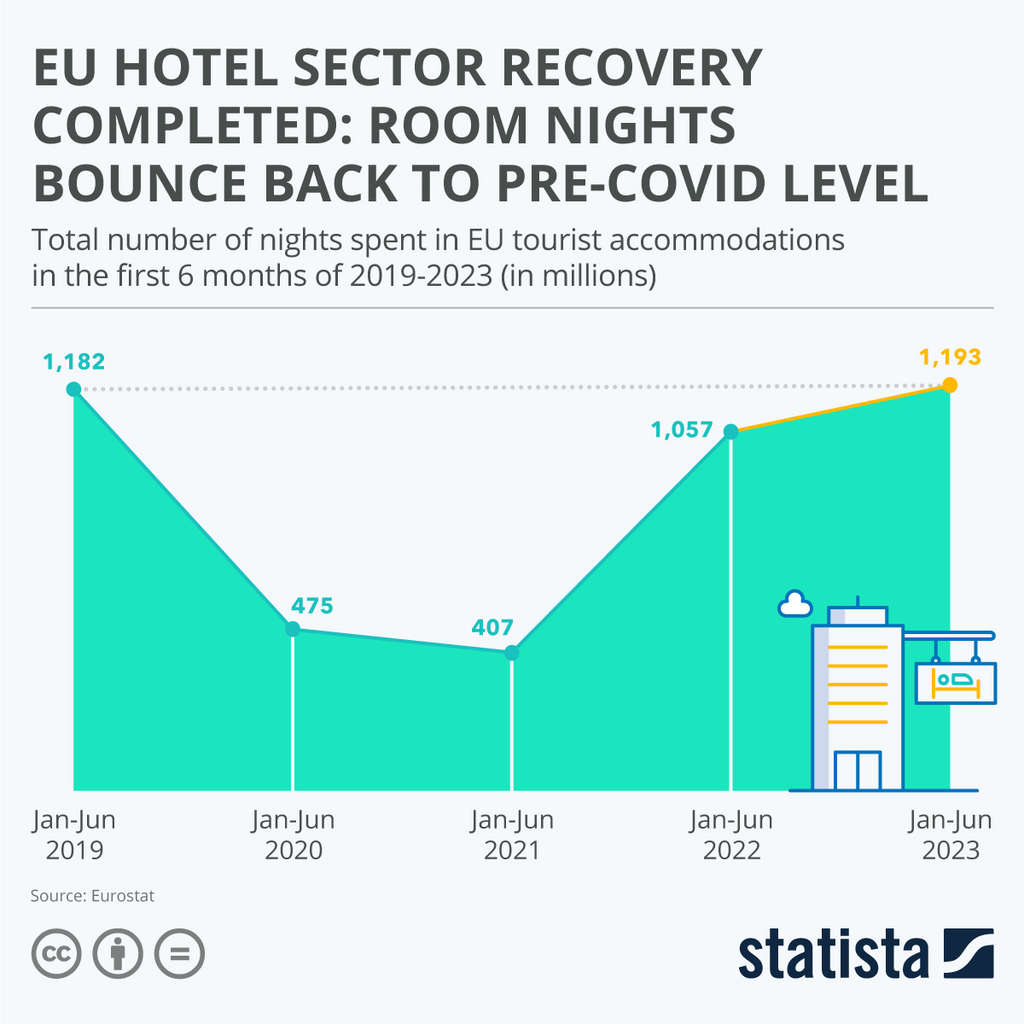The European travel accommodation sector transformed. What’s next?
Travel is a force for good in the world, and it is also a powerful economic engine. Before the pandemic, WTTC calculated that the tourism sector was responsible for 1 in 5 new jobs and accounted for roughly 10% of global GDP and an equal share of employment. International tourism as an export service amounted to staggering $1.9 trillion in 2019. This is why I’m really encouraged by the UNWTO’s latest announcement stating that international arrivals have reached 84% of pre-pandemic levels and the sector recovery is continuing apace. In Europe, where Booking.com is headquartered, we’ve reached 91% of pre-pandemic levels.

In this context, it’s important to recognize the impact of digital platforms like ours, which have not only empowered small and independent accommodations to compete but have also enriched the travel experiences for millions of people worldwide.
Tourism Accommodation Sub-sector Recovery in Europe
It is impossible to discuss the current state of the travel industry without acknowledging the destructive impact of the pandemic. However, I am pleased to note the recovery of Europe's accommodation subsector has now been achieved. As assessed by Eurostat and covered in the third edition of the Accommodation Barometer, we now know that in the first half of 2023, the number of nights spent in European tourist lodgings reached and exceeded the pre-COVID benchmark year 2019.
In the previous European Accommodation Barometer (2nd edition) carried out by our research partner, Statista, nearly half of the hoteliers – presciently – expected to set revenue records in 2023. And now, the sentiment towards future prospects is the brightest we’ve seen across the three editions. It is true that inbound travel from Asia still lags behind, but that speaks more about opportunities yet to be unlocked, rather than signals for concern.
Lessons on Sustainability
Sustainability has become a crucial aspect of the travel industry. Consumer awareness has never been this high and, as profitability in the hospitality industry is finally making a comeback, a window of opportunity to introduce new practices is open wide. At Booking.com, we have implemented a multipronged Travel Sustainable programme, and I’m convinced it's already helping to accelerate a flywheel of sustainability in our sector. I am optimistic that, as time progresses, more travelers will prioritize sustainable options, which providers will offer at an ever-growing scale, thus contributing to a better future for all.
Supporting Small and Medium-Sized Enterprises (SMEs)
Gone are the days when travelers had limited options for where to stay. Thanks to digital platforms, small and independent establishments now have an equal opportunity to compete with international chains. At Booking.com, we provide a level playing field for smaller properties to showcase their unique offerings and attract guests from around the globe. By offering a user-friendly interface, comprehensive search options, and transparent reviews, we enable travelers to discover hidden gems and experience the local charm that often eludes transnational brands, which focus on consistency of offerings.

Moreover, we make available, free of charge, practical and timely analytics that allow small hotels to optimize their operations. From occupancy rates to pricing strategies, Booking.com provides real-time data and performance metrics, enabling smaller establishments, especially, to refine their offerings, enhance guest experiences, and ultimately attain a higher level of competitiveness.
Travel platforms also play a pivotal role in fostering trust between travelers and small accommodations. In today's digital age, where reviews and recommendations hold significant sway, platforms offer a transparent and reliable system for guests to share their experiences. The ability to read authentic feedback from fellow travelers builds confidence in guests to choose independent accommodations over alternatives with a global name recognition. For small businesses, positive reviews can be a game-changer, as they create a virtuous cycle of trust, leading to increased bookings and an expanding customer base.

Cost of Living, Technology, and the Future
At Booking.com, we understand the current cost of living crisis in Europe and worldwide. This is where our risk-free model of partnership with accommodations is more important than ever: we help the hotel put ‘heads in beds’ while keeping customer acquisition costs in check. Neither do we charge our partners to list on Booking.com, which helps alleviate distribution and marketing costs for SMEs. There is also a well documented impact on affordability of vacations for less affluent families, who would otherwise be priced out of the market.
The rapid evolution of technology, including artificial intelligence (AI), has been transformative for the travel industry. Headquarter in Europe, Booking.com has been an early adopter of AI and machine learning models for over a decade. And we are thrilled to unveil a new AI trip planner, which, without exaggeration, is one of the most exciting product launches across the travel industry.
Over the years we’ve demonstrated and reaffirmed our commitment to Destination Europe. And our dedication to sustainable practices speaks for itself. Online travel platforms, like ours, play a central role in nurturing small and independent hotels, enabling them to thrive in an increasingly competitive landscape.
So let me conclude by saying that, together, we can build a stronger and more sustainable travel industry that creates jobs, drives economic growth, and ultimately benefits travelers and communities, who welcome them in Europe.


